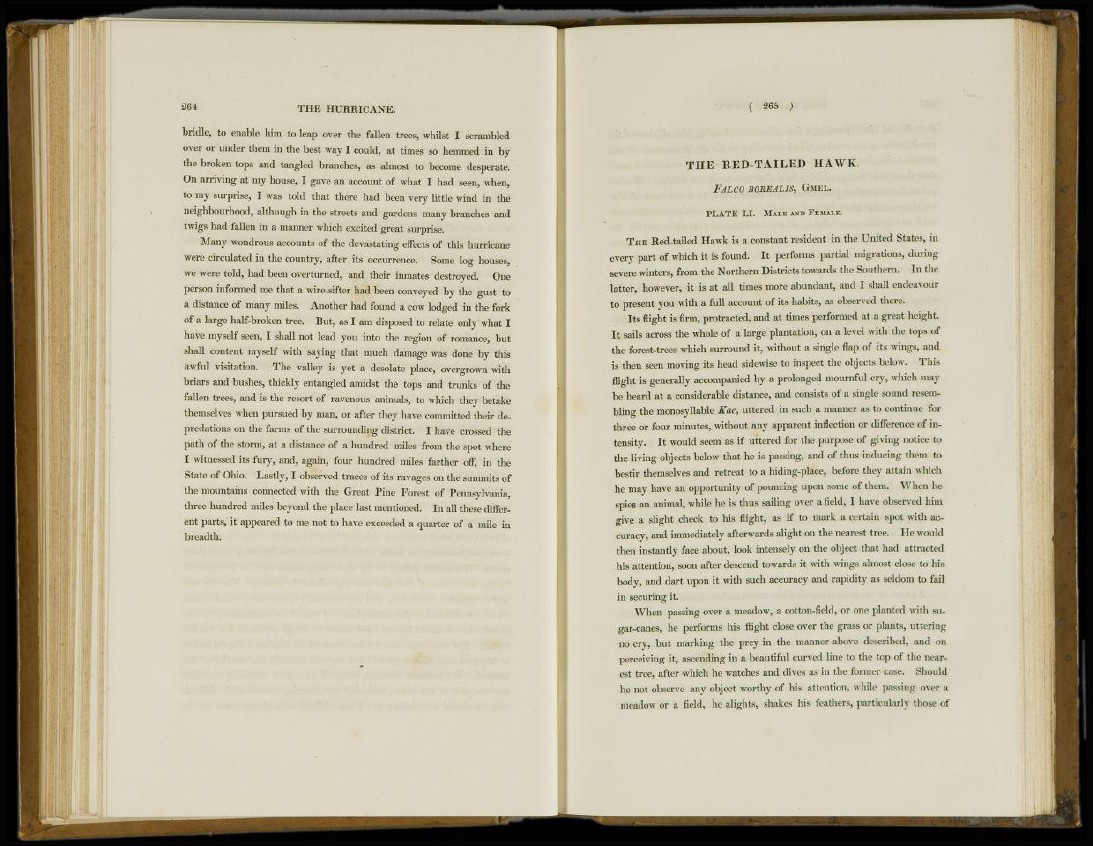
264 THE HURRICANE.
bridle, to enable him to leap over the fallen trees, whilst I scrambled
over or under them in the best way I could, at times so hemmed in by
the broken tops and tangled branches, as almost to become desperate.
On arriving at my house, I gave an account of what I had seen, when,
to my surprise, I was told that there had been very little wind in the
neighbourhood, although in the streets and gardens many branches and
twigs had fallen in a manner which excited great surprise.
Many wondrous accounts of the devastating effects of this hurricane
were circulated in the country, after its occurrence. Some log houses,
we were told, had been overturned, and their inmates destroyed. One
person informed me that a wire-sifter had been conveyed by the gust to
a distance of many miles. Another had found a cow lodged in the fork
of a large half-broken tree. But, as I am disposed to relate only what I
have myself seen, I shall not lead you into the region of romance, but
shall content myself with saying that much damage was done by this
awful visitation. The valley is yet a desolate place, overgrown with
briars and bushes, thickly entangled amidst the tops and trunks of the
fallen trees, and is the resort of ravenous animals, to which they betake
themselves when pursued by man, or after they have committed their depredations
on the farms of the surrounding district. I have crossed the
path of the storm, at a distance of a hundred miles from the spot where
I witnessed its fury, and, again, four hundred miles farther off, in the
State of Ohio. Lastly, I observed traces of its ravages on the summits of
the mountains connected with the Great Pine Forest of Pennsylvania,
three hundred miles beyond the place last mentioned. In all these different
parts, it appeared to me not to have exceeded a quarter of a mile in
breadth.
( 265 ;
T H E RED-TAILED HAWK.
FALCO BOREALIS, GMEL.
P L A T E LI. M A L E A N D F E M A L E .
T H E Red-tailed Hawk is a constant resident in the United States, in
every part of which it is found. It performs partial migrations, during
severe winters, from the Northern Districts towards the Southern. In the
latter, however, it is at all times more abundant, and I shall endeavour
to present you with a full account of its habits, as observed there.
Its flight is firm, protracted, and at times performed at a great height.
It sails across the whole of a large plantation, on a level with the tops of
the forest-trees which surround it, without a single flap of its wings, and
is then seen moving its head sidewise to inspect the objects below. This
flight is generally accompanied by a prolonged mournful cry, which may
be heard at a considerable distance, and consists of a single sound resembling
the monosyllable Kae, uttered in such a manner as to continue for
three or four minutes, without any apparent inflection or difference of intensity.
It would seem as if uttered for the purpose of giving notice to
the living objects below that he is passing, and of thus inducing them to
bestir themselves and retreat to a hiding-place, before they attain which
he may have an opportunity of pouncing upon some of them. When he
spies an animal, while he is thus sailing over afield, I have observed him
give a slight check to his flight, as if to mark a certain spot with accuracy,
and immediately afterwards alight on the nearest tree. He would
then instantly face about, look intensely on the object that had attracted
his attention, soon after descend towards it with wings almost close to his
body, and dart upon it with such accuracy and rapidity as seldom to fail
in securing it.
When passing over a meadow, a cotton-field, or one planted with sugar
canes, he performs his flight close over the grass or plants, uttering
no cry, but marking the prey in the manner above described, and on
perceiving it, ascending in a beautiful curved line to the top of the nearest
tree, after which he watches and dives as in the former case. Should
he not observe any object worthy of his attention, while passing over a
meadow or a field, he alights, shakes his feathers, particularly those of